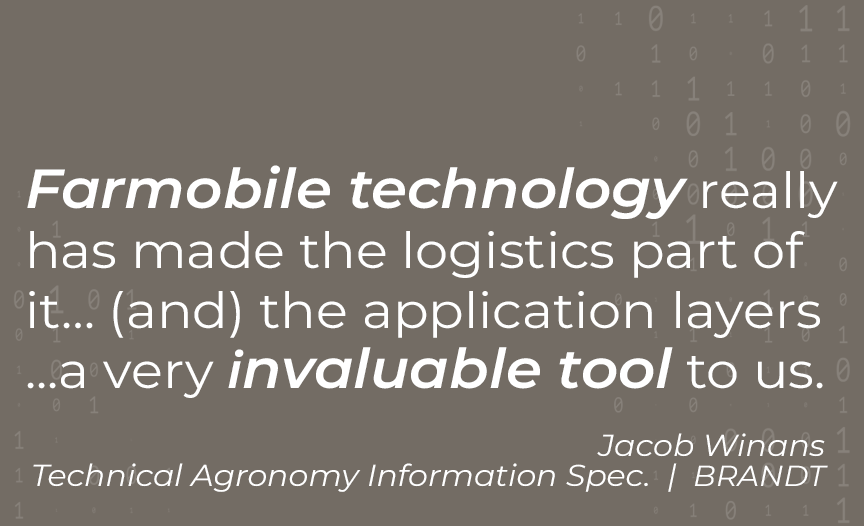Can your fleet manager see all the data? Shouldn’t they be able to?
By: Farmobile Editors
. . .
Logistics and having timely, accurate data to empower in-field fleet decisions lie at the core of every ag retail business, and oftentimes mean the difference between a profitable application and a loss.
Just planning out applications, applicator refills and remote equipment scheduling is no small feat — especially when you’re dealing with a mixed fleet of makes and models across multiple locations. That’s why Farmobile’s ability to capture and normalize agronomic and machine-ready data — at scale and in real-time — is so vital.
A tale of two real-time advocates
Centra Sota Co-op, Buffalo, MN, and BRANDT, Springfield, IL, were both all too familiar with the challenges inherent to fleet management — their large commercial fleets could be operating hundreds of miles apart from each other, making fleet logistics management difficult and costly.
Both organizations sought out a solution that could work across their mixed make and model fleets and grant them the unprecedented visibility, speed and data transparency they desired. They turned to Farmobile, which outfitted a test batch of fleet with their proprietary PUC™ device and cloud-based Farmobile DataEngine platform, so fleet managers could gain access to real-time data.
The results? Utilizing 10 percent of acres enrolled in their Yield Quest program, Centra Sota Co-Op experienced three years of steady performance and digital growth in the wake of choosing Farmobile. In fact, Centra Sota estimated that every 10 percent of precision acres added would result in a bottom-line increase of $1.25M. And, BRANDT, which experienced real-time fleet visibility in their trial with Farmobile, has since outfitted their entire fleet of equipment and tender trucks with real-time data collection.
Centra Sota: From logistics to ROI
“The biggest hurdle right away was collecting that information across different brands that you guys (Farmobile) were able to solve for us by working on a mixed fleet of equipment,” said Andrew Lambert, Centra Sota’s technology services manager. “Real-time data has transformed us. At some of our locations … you’ll have anybody from a crop advisor to an operations manager watching our machines LIVE on the big screen.”
For the past three years, Centra Sota has used real-time data collection for logistics benefits. Over time, however, the value has expanded to an even greater focus on agronomic and machine analytics which have allowed the cooperative’s fleet team to peel back performance and progress as well as insights to inform better buy-sell-lease decisions.
“With the month-by-month reports … we can look back and see where we spent our time, what goals we’ve established and have we made any progress on those goals,” noted Lambert.
Last year, during an Agricultural Retailers Association webinar, he relayed how Centra Sota will be able to use used Farmobile’s “work rate by activity and location” comparisons to cover more application acres with fewer machines.
“We have 60-plus machines running and, conservatively, they cost a quarter million dollars a piece. With a 10-year rotation, you’re looking at managing $15M worth of equipment. So keeping an eye on anything from engine hours will help us pick out machines that are getting up there,” he noted.
“If we get over X many thousand (tach) hours, that machine really loses its value. So maybe it’s time to trade if off for a newer type of machine that we bought the previous year,” Lambert continued. “We can go back and evaluate that machine to find out how much faster and how many more acres it is able to get done on variable rate or flat rate jobs.… It’s definitely going to have a play on when and how often machines get bought and sold; also which locations are up next to get the new machines.”
As a full service agronomy provider, being able to dive deeper into locations and different activities is one of Centra Sota’s pathways into identifying areas of improvements.
BRANDT: Better dispatch
“Adopting this Farmobile technology — the logistics part of it, the efficiency part, as well as being able to have the application layers for our growers — has been a very invaluable tool to us,” said Jacob Winans, technical agronomy information specialist at BRANDT.
According to Winans, one logistics challenge the company had faced was full-fleet visibility — commercial fleet operators could be operating miles away from each other. Consequently, managing fleet logistics, machines and operator status on fieldwork was increasingly difficult.

Another challenge was the ability to show as-applied data to farmer-customers when application work was complete. The dispatch team relied heavily on operators to report acres covered and how much was applied within each field boundary. The BRANDT team wanted a more streamlined, accurate solution.
The trial, which initially tracked 12 applicators across three Illinois locations, achieved three of BRANDT’s fleet objectives:
- Greater fleet dispatch and tracking efficiency (real-time views)
- LIVE and historic agronomic data (with heat maps by attribute)
- More accurate record-keeping (viewable and downloadable 24/7
Time is money. And, Winans noted that real-time data created new efficiency scenarios that allowed the BRANDT dispatch team to optimize fleet performance.
For instance, he outlined one scenario: “They (dispatch) know that, hey, tender truck A is going to get here before tender truck B or down the line; and they can actually use that 5 or 10 minutes to be able to get another mix in the pot and get going. And then, as soon they get there, blow it back in and get that truck back out on the road. Maybe get another 80 acres that day right before dark based on having better decisions being made.”
Real-time data really does matter.
Agronomic and machine data collected across an entire fleet, in real-time, has true dollar value — first with logistics and then by deploying data analytics to fuel insights for small and large fleet wins.
“Whether it’s optimizing fleet logistics or using the data to reduce idle time or tell a more precise fleet performance story, real-time data contributes to a leaner, meaner fleet at the end of the year,” said Steve Cubbage, Farmobile vice president of services.
These proven efficiencies and increased visibility derived from real-time data will enable ag retailers to deliver faster, more efficient service to their farmer-customers with heretofore untapped profits while reducing risk.
It is truly the dawn of a new era in agriculture. Done with real-time.
. . .

